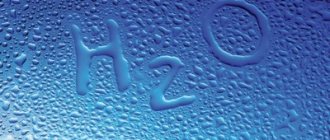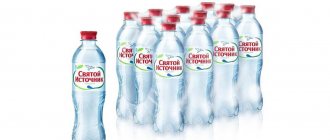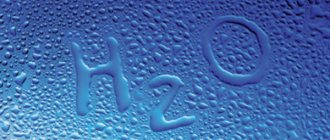From this article you will learn:
- What is the importance of drinking water for the body?
- What is the right water to drink?
- How to stay hydrated throughout the day
- How to calculate drinking water consumption rates
- What types of drinking water are there?
- How to drink melt and lemon water
- Why is it good to drink water on an empty stomach?
- What is the importance of water for weight loss?
- How to drink during exercise
- Why you shouldn’t drink during and after meals
- Why you can't replace water with other drinks
- How carbonated water is harmful to the body
The human body consists of almost 60–70% water. Liquid is one of the strongest solvents of all harmful substances entering the body and a catalyst for metabolic processes. When it arrives in sufficient quantities, all tissues and organs work at full capacity, because metabolic products are excreted on time, and metabolic processes proceed quickly. Therefore, a person must maintain water balance. From this article you will learn how to drink water properly and why it is needed.
Why is it important to drink water
With a lack of water, the kidneys do not function at full capacity, because they do not have enough fluid to absorb from the blood, process, dissolve and remove with urine all substances toxic to the body. This causes urine to become more concentrated, which over time can lead to the formation of kidney stones.
If the kidneys perform their functions poorly, then higher demands are placed on the liver, which is also an organ that neutralizes harmful substances. Because of this, the liver cannot properly process fat obtained from food and accumulated in the body into energy. All this leads to stagnation, which contributes to the formation of stones. In addition, the liver ceases to actively participate in fat metabolism, lipids begin to accumulate in the body faster, and the person gains extra pounds.
That is why it is important to know how to drink water correctly and how much, because when there is a lack of water in the body, an emergency mode of water saving is activated. As a result, the following phenomena are observed.
On the one hand, the absorption of water from the feces in the intestines begins. This causes constipation.
On the other hand, the body tries to accumulate fluid by any means, depositing it in the intercellular space, and this leads to the appearance of edema.
Recommended articles on this topic:
- How to check water quality: independently and in the laboratory
- Drinking water at home: health comes first
- Is it possible to drink tap water, and what should you be wary of?
It should be understood that taking diuretics will help improve a person’s condition only for a short time, since they act on the effect, and not on the cause that caused the edema. And no matter how strange it may sound, the best method of getting rid of puffiness is to learn how to drink water correctly and start consuming it in sufficient quantities. As a result, the body will stop storing fluid and swelling will gradually subside.
According to WHO, more than 80% of all diseases that affect humanity are associated with a lack of water in the body.
Many experts believe that constant water deficiency - chronic dehydration - is the cause of the development of many diseases, such as hypertension, bronchial asthma, obesity, allergies, depression and a number of other psycho-emotional disorders.
A constant lack of water gradually leads to significant disturbances in the body. There is a decrease in performance, drowsiness, fatigue, digestive disorders, etc. A dehydrated body begins to conserve fluid and reduces the speed of biochemical processes, as a result, blood viscosity increases, which, in turn, leads to the formation of blood clots. Problems also begin with the central nervous system, because the human brain consists of 75% water. Therefore, when there is a lack of fluid, stress occurs in brain cells, leading to decreased concentration, attention and memory impairment.
Are there any restrictions?
Sometimes life-giving moisture carries mortal danger. This is usually due to individual contraindications that a person has. In this case, a doctor will help you find out how much water a man needs to drink per day. Drinking too much is dangerous if you have heart disease. The possibility of developing edema poses a huge burden on the body. And even if the water norm for a man per day is set at the lower limit, it’s definitely not worth arguing with doctors in this case. For stomach diseases, excessive fluid intake is also contraindicated. And this is due to the fact that water dilutes gastric juice, preventing normal digestion. For diseases of the kidneys and urinary system, large amounts of drinking are absolutely contraindicated, since it trains the natural filtration system to work with a certain volume of excreted fluid. Under certain circumstances, this can lead to rapid dehydration.
Tips on how to drink water properly
How much water should you drink per day? There is no exact answer to this question. If you are not accustomed to consuming large volumes of liquid daily, then you should not force yourself to drink. The rate should be increased gradually, over at least two weeks. Remember the basic rules:
- The body can get water from drinks and food. Enrich your diet with fresh fruits and vegetables.
- Feel your body and don't force yourself into the standard 6-8 glasses of water a day. Each person's needs are individual.
- It is correct to drink water in its pure form, because it does not contain extra calories, sugars, salts and any other substances that can negatively affect health.
- If you are going for a walk, drink water at home. During physical activity, it is correct to drink water in small portions, otherwise sweating may increase, which means dehydration will occur faster.
- During air travel, try to drink as much as possible, because the air in the aircraft cabin is very dry due to high pressure. Therefore, it is necessary to consume enough water to avoid dehydration.
- In the summer, it is right to drink as much water as possible, since the body loses a significant amount of fluid in hot weather. In this regard, to maintain water balance, it is better to drink a lot of liquid, but you need to increase the daily norm gradually and carefully. How to drink water correctly in hot weather? Experts recommend adding 0.5 liters to the usual volume. It would be enough. If you drink even more, sweating may increase.
- You should not drink too cold water in hot weather, because due to a sharp temperature change, even people with strong immunity can get a sore throat.
- It is also necessary to increase the amount of liquid consumed during the heating season, because at this time the indoor air becomes very dry. You can also install a humidifier in your home.
So, what kind of water is right to drink? Its temperature should not be too high or too low. Cold weather can cause spasm of the vocal cords, loss of voice, and provoke a sore throat or cold. Although scientific research has proven that cool water accelerates metabolic processes, since the body has to expend energy to “heat” it. But drinking hot water is not very correct, because it can destroy tooth enamel and cause burns to the oral cavity and other parts of the digestive tract.
Also remember that liquid removes not only toxic, but also beneficial substances from the body. Therefore, it is important to monitor your diet; you must add fresh fruits, vegetables, and nuts to your diet. It will also be correct if you drink mineral water.
You may also be interested in: What water to drink for children: recommendations from experts
What are the standards?
The intensity of fluid loss largely depends on the physical condition of the person. You can find out how much water a man should drink per day, taking into account established standards, based on his body weight. Every 10 kg of weight requires drinking 400 ml of liquid per day. Playing sports only increases the stress on the body. Accordingly, there is no need to expect that you will have to consume less fluid. In fact, during the training process you need to make up for losses. And after it, for every 100 g of weight loss you need to drink 150 ml.
Physical activity is not always part of the daily routine. If in the course of everyday life physical activity is at zero, this is not at all a reason to reduce the volume of fluid entering the body. But how can one understand how much water a man needs to drink per day if, in addition to pure liquid without additives, he also consumes tea, coffee, and juices? First of all, you should remember: the male body really needs more water than the female body. And if your diet includes alcohol, coffee, salty foods, and spicy foods, it will be necessary to ensure the most accurate calculation of the volume of fluid consumed (how much an adult man should drink per day).
How to drink water correctly during the day
How to drink water in the morning and is it necessary to do it at all? Many people ask this question. Try to train yourself to drink 2 glasses of clean water immediately after waking up. During the night, a person loses up to 1 liter of fluid, which evaporates from the surface of the skin and during breathing. Therefore, in order to prevent dehydration, awaken the body and start metabolic processes, it is necessary to replenish moisture loss. Just one glass of water drunk in the morning speeds up metabolism by about 20%.
It is also good to drink water in the morning on an empty stomach because it cleanses the urinary and digestive systems. Immediately after sleep, the stomach is empty, and the liquid, without lingering in it, almost immediately enters the intestines. Thanks to this, the gastrointestinal tract is cleared of food debris, which prevents fermentation, rotting and the formation of fecal stones. It is also necessary to drink 1 glass of warm water about 40 minutes before starting a meal.
It is correct to drink water after each visit to the toilet to replenish its loss.
Smokers and people taking alcohol and various medications (including laxatives, diuretics) are advised to drink plenty of clean water. At the same time, it is worth remembering that consuming a large volume of liquid at a time puts a lot of strain on the kidneys and negatively affects metabolic processes. Therefore, it is correct to drink water in small portions every 1-2 hours.
Remember that thirst should not be ignored. It needs to be quenched with clean drinking water. In addition, sometimes hunger is a sign of a lack of fluid in the body.
Benefits of a glass of water
The famous long-livers Japanese pass on the secret of their longevity from generation to generation - they start every day with a glass of clean water. Numerous studies confirm that this simple manipulation not only strengthens the body, but also has a complex therapeutic and preventive effect on it.
Natural cleansing of body systems
There are many factors (unfavorable environmental situation, addiction to fast food, sedentary lifestyle, etc.) that contribute to the accumulation of toxins in the body, which reduce its resources and negatively affect well-being.
Water drunk in the morning on an empty stomach activates the cleansing processes that started during sleep.
The liquid helps not only remove toxins from the body, but also refresh the complexion and improve the condition of hair and skin.
Acceleration of metabolism
Metabolism is one of the most important processes in the body. A glass of water drunk in the morning on an empty stomach is the driving force that starts the metabolism, giving it an additional boost. Just half an hour is enough for the metabolic rate to increase by 20-30%.
Optimizing the functioning of the gastrointestinal tract
Drinking water in the morning promotes the formation of gastric enzymes and normalizes the digestion process, allowing you to get rid of the feeling of heaviness caused by a large dinner the day before. With its help, the level of acidity in different parts of the stomach is minimized. Therefore, people suffering from gastritis or ulcers should regularly drink a glass after sleep to cope with colic and reduce the burning sensation.
Elimination of pain
Antispasmodic pain (headaches, menstrual pain, joint pain) is also easy to overcome with the help of life-giving moisture. Warm water, drunk in the morning on an empty stomach, will be an excellent antispasmodic and will allow you to get rid of unpleasant sensations throughout the body.
Weight loss
Active cleansing, which begins in the body after drinking water, not only removes waste and toxins, but also promotes weight loss. However, it will not be possible to achieve a slim figure using this method alone.
Normalizing body weight is a complex process, which, along with cleansing, should be supplemented with physical activity and proper nutrition.
Improved health and energy potential
The healthy habit of drinking water in the morning activates the circulatory, lymphatic and genitourinary systems, strengthens the immune system and increases the body's resistance to various infectious diseases. In addition, morning drinking promotes cell regeneration at various levels, helps maintain skin tone, and also helps overcome drowsiness and gives a good mood.
How to drink water correctly: table
The amount of fluid required daily depends on the body weight, living conditions and physical activity of the individual. There is an opinion that you need to drink at least 2 liters of clean water per day to maintain body tone. There are two ways to calculate an individual norm:
- 40 ml of pure water per 1 kg of human body weight;
- The volume of water should be equal to or slightly greater than the number of calories consumed during the day.
| Daily water intake | |||
| Weight, kg | Low physical activity | Moderate physical activity | High physical activity |
| 50 | 1,55 | 2,0 | 2,3 |
| 60 | 1,85 | 2,3 | 2,65 |
| 70 | 2,2 | 2,55 | 3,0 |
| 80 | 2,5 | 2,95 | 3,3 |
| 90 | 2,8 | 3,3 | 3,6 |
| 100 | 3,1 | 3,6 | 3,9 |
You may also be interested in: The benefits of water for humans in terms of health and beauty
How much fluid should you drink per day?
You need to drink at least two liters of water (8-10 glasses) per day. This opinion is shared by most modern nutritionists. For people with normal weight, the required volume of water is calculated using a simple formula: per 30 kg of body weight - 1 liter of water. This does not include the consumption of soups, juices, tea, coffee and other liquid foods. Otherwise, the body will perceive these liquids as food, and for the normal course of metabolic processes, pure water without any additives is required.
Coffee and coffee-based drinks, by the way, contribute to dehydration. Therefore, along with a small cup of coffee, you should always drink one large glass of water. Of course, these figures are very conditional and are selected individually, but they indicate the need for regular consumption of large amounts of fluid.
How to drink melt water correctly
Many people know that drinking melt water has a very positive effect on human health. Firstly, it contains much less harmful impurities. Secondly, ice has a crystal-like, ordered structure that interacts well with the cells of the human body.
Daily drinking of melt water:
- Increases the body's immune strength.
- Improves blood composition and improves the functioning of the cardiovascular system.
- Rejuvenates and cleanses the body.
- Speeds up metabolic processes and reduces weight.
In addition, melt water activates performance and improves sleep. Doctors advise people with high cholesterol to drink it. It also removes harmful and toxic substances from the body, and therefore is the key to health and longevity.
How to drink melt water correctly to lose weight and improve overall well-being? How to cook it? It’s easy to do this at home; you don’t need any special equipment or skills. But it is important to know which liquid can be used for this purpose and which cannot. The fact is that some water not only does not benefit the body, but also harms it. Firstly, you should not use one that has been boiled. Tap water is also not suitable, because it contains chlorine, which has carcinogenic properties, especially after heat treatment.
To prepare melt water, you cannot use snow or ice from the street. They contain a fairly high concentration of harmful chemical impurities, which will be almost impossible to get rid of. Dust, exhaust gases and other contaminants settle and penetrate into the thickness of snow and ice. Therefore, if you value your health, then refuse to use contaminated water.
To drink melt water correctly, it must be properly prepared. This process consists of 3 stages: primary and secondary freezing, thawing. The liquid must be filtered and poured into a plastic bottle or enamel pan. Remember that water expands when it freezes, so do not fill the container to the brim. The pan or bottle should be closed with a lid and placed in the freezer.
In winter, you can freeze water on the balcony to save space in the refrigerator. After a few hours, a crust of deuterium ice forms on the surface of the water. This is where the bulk of harmful substances are contained, so it should be removed.
After this, the water must be poured into another container, and the walls of the pan or bottle must be cleared of deuterium ice. At the next stage, only 70% of the prepared liquid is frozen. It needs to be put back in the freezer. It is recommended to note the time so that next time you will know how many hours it takes for this amount of water to freeze. Then you should take out the ice and pour out the unfrozen water, since it contains a large amount of salts and harmful substances.
The ice must be absolutely transparent, so if there are white or yellow areas in it, they must be removed with a stream of hot water.
Ice should be defrosted at room temperature without additional thermal exposure. You can leave it to thaw in the same container in which it was frozen, or you can use a knife to break off a piece and place it in a glass. Under no circumstances should you heat or speed up the defrosting process, as in this case the melt water loses all its beneficial properties.
It is correct to drink two glasses of melt water a day. It should be consumed slowly, in small sips. If you drink cold water quickly, a sore throat may develop. When heated, as well as during long-term storage, the liquid loses its beneficial properties. After just a day, melt water will be little different from tap water. Therefore, there is no point in using it during cooking.
Some tips for using melt water:
- It retains beneficial qualities for the body in the first 7-8 hours after defrosting.
- It cannot be heated to more than +37 °C.
- You don't need to add anything to it.
- It is correct to drink melt water immediately after thawing, when its temperature is less than +10 °C.
- It should be consumed gradually throughout the day in small sips, warming the mouth.
- It is correct to drink melt water on an empty stomach, immediately after waking up or before meals. Then, for an hour after eating, it is not recommended to drink or eat anything.
- For medicinal purposes, it should be consumed 30 minutes before meals 4-5 times a day for a month. It is correct to drink melt water in a volume of 1% of body weight per day. For example, if you weigh 60 kg, then you need to drink 600 ml of this liquid per day. Over time, the dosage is reduced to 50% of the initial one. For the purpose of prevention, melt water should also be drunk in half the dose.
Melt water does not cause side effects and has no contraindications for use.
You may also be interested in: How much water should a pregnant woman drink: the drinking regime of the expectant mother
How to drink lemon water correctly
How to drink water with lemon correctly? It should be consumed on an empty stomach. A glass of lemon water, drunk an hour before breakfast, will start metabolic processes in the body and tone the body. You can drink this drink at other times of the day, but it is the morning intake of water with lemon that gives a significant effect. And in order for this citrus to be beneficial for the body, you should take into account the characteristics of drinks with its addition.
In order to properly prepare the drink, you will need half a lemon and warm water. It must be done before taking it, because in fresh juice the concentration of beneficial components is much higher. In addition, after a while, lemon water begins to taste bitter. Also, do not add too much juice to the water, as a large amount of acid can irritate the mucous membrane of the digestive tract.
To prevent the drink from getting boring, you can add mint or ginger to it. It is also correct to drink water with honey.
How to drink water on an empty stomach
How to drink water in the morning? This must be done on an empty stomach. Such a morning ritual will help your body invigorate, launch metabolic processes and prepare the gastrointestinal tract for receiving and digesting food. By starting to take fluids in the morning, you can normalize your drinking regimen, and it will be easier for you to drink more water throughout the day to constantly replenish its reserves in the body.
The adult human body is approximately 70–72% water. Scientists and doctors are sure that in order to maintain youth and health, it is very important to maintain water balance and quench thirst on time.
Water drunk on an empty stomach:
- Prepares the digestive tract for receiving and digesting food.
- Cleanses and thins the blood.
- Activates intestinal motility and gives a mild laxative effect.
- Catalyzes metabolic processes in the body.
- Helps get rid of extra pounds.
Also, drinking water on an empty stomach prevents epileptic seizures, exacerbations of gastritis and ulcers, treats headaches, diseases of the urinary system, relieves tachycardia, and improves the general condition of the body.
It is correct to drink water in the morning only in its pure form. It should not be boiled, mineral, or distilled. Also, you should not replace it with other drinks such as tea or coffee. It is best to drink clean filtered water.
- The first glass of water should be drunk 40–60 minutes before breakfast, after which you should not eat for about two hours.
- The water temperature should be +30…+35 °C. The liquid should not be too hot or cold, as this will negatively affect the subsequent functioning of the stomach.
- You need to take water in small sips. If one glass is not enough for you, then after 10 minutes you can drink a second one.
Some doctors agree that for enhanced detoxification of the body, it is correct to drink water with soda in the morning.
You may also be interested in: Bottled drinking water: what are its benefits and how to choose the best quality
How to drink water correctly to lose weight
How to drink water correctly to lose weight? Advice from nutritionists will help you find the answer to this question. Extra pounds appear not only due to excess calories and an unbalanced diet. Insufficient intake of drinking fluid also contributes to the accumulation of fats in the body.
Many people, in an effort to quickly lose weight, often take laxatives and diuretics. The body loses fluid, the scale shows lower numbers, but at the same time dehydration occurs, health problems arise, metabolic processes slow down, including the breakdown of fat deposits.
Pure drinking water is the best diuretic. If you consume it in sufficient quantities, the body will not store liquid. On the contrary, it will be cleansed, and organs and systems will begin to work like clockwork. Therefore, drink water correctly and lose weight! You shouldn’t expect miracles; you won’t lose all the excess weight right away, but some of the extra pounds will go away quickly enough.
Keep in mind that weight loss can be achieved by normalizing metabolic processes in the body, removing excess fluid and toxic substances. Fat tissue breaks down slowly, so water alone will not solve the problem of excess weight; you will have to properly organize your diet and introduce regular exercise.
If you know your weight, you can easily calculate the individual amount of water you need to drink per day to lose weight. There are two main approaches:
- Compliance with the norm. For people who want to lose weight, it would be right to completely or at least partially replace their favorite drinks (compotes, coffee, tea) with plain water. The main thing is that its quantity does not exceed the individually calculated norm. This approach is designed for the long term.
- Increasing the volume of fluid you drink. The essence of this approach is to quickly saturate the body's cells with water, activate metabolism, and also deceive the stomach and brain cells responsible for hunger. This way, you can wean yourself off unnecessary snacks. The amount of water you drink increases by 0.5 liters per day. This approach is designed for the short term.
How to drink water correctly during physical activity
If you are physically active and regularly exercise, then you need to prepare for training 2 hours before it starts. At this time, you need to drink a cup of unsweetened tea or a glass of natural freshly squeezed juice, and a few minutes before class you should take a few large sips of water.
During sports, the body itself will notify you that it lacks fluid. You will know when it's time to drink if your saliva becomes thick and your throat becomes dry. An unpleasant taste and odor may appear in your mouth. These symptoms indicate that the body is actively burning fat. Metabolic products are excreted by the kidneys in the urine, so you need to promote their normal functioning. During physical activity, it is correct to drink water in small quantities every 10–15 minutes.
And only after finishing your workout can you drink a whole glass of still water. Remember that during physical activity the body loses not only fluid, but also salts. Therefore, after playing sports, it is correct to drink mineral water. You can also rinse your mouth with lightly salted water.
During strength training, the body does not lose water as quickly or intensely as during cardio exercise. Therefore, you may not feel thirsty. In this case, it is important to focus on your feelings and drink when you want. You can, in principle, not drink water at all. But after finishing your strength training, you should still drink 1-2 glasses of liquid.
The correct way to drink water during physical activity is as follows:
- 2 hours before the start of training – 1–1.5 glasses;
- 10 minutes before exercise – 80–100 ml;
- during sports – 100–150 ml every 15–20 minutes;
- after training - a glass of water, after 15 minutes you can drink more if you have not completely quenched your thirst.
You may also be interested in: How to choose a water cooler: a detailed guide to action
How much water to drink
A lot of research and experiments have been conducted on the amount of average daily water consumption. There is no clear and absolute figure; different calculation methods are used, but almost all of them converge on the figure of 2 l/day.
At the same time, there is a logical statement that you need to drink as much water as your body requires; pouring liquid into yourself through force is pointless.
When determining your daily water consumption rate, you must be guided not only by generally accepted standards, but also by other aspects:
- If the patient takes medications during treatment, more fluid will be needed to remove toxins.
- In the hot season, water takes part in cooling the body, therefore, you need to drink more often.
- Heavy physical workers, athletes, and anyone whose body is under increased stress drink more.
- Women need water in slightly larger quantities to prevent cellulite.
- Children also need more water due to their activity, which increases water consumption.
Is it right to drink water during and after meals?
The process of digestion is aimed at digesting and assimilating food entering the body. To do this, food must be broken down into elementary particles - nutrients, which easily penetrate the intestinal wall and enter the blood, providing the body with energy for physical and mental activity. Digestion begins as soon as food is in the mouth.
During chewing, food is crushed and soaked in saliva containing enzymes - these are biologically active substances that catalyze the digestion process. Also, with the help of saliva, a food bolus is formed, which, after passing through the esophagus, enters the stomach, where the main processes of digestion begin under the influence of gastric juice. The latter contains hydrochloric acid and a number of enzymes. Then the food enters the small intestine and then the large intestine.
There is an opinion that you should not drink food with water, because it dilutes the gastric juice, which reduces its acidity and slows down the action of enzymes. All this leads to incomplete digestion of food in the stomach and its rotting in the intestines. This point of view is quite logical and reasonable, but not everything is so simple.
The mucous membrane of the stomach forms deep folds, so water does not stay in it, but flows down these folds into the duodenum. The liquid does not affect the acidity of gastric juice in any way, and food is digested normally. But this condition is met only with a normal size of the stomach. If you eat too much, the stomach will stretch and the folds will smooth out. Then water will not be able to quickly enter the intestines. In this case, the liquid will reduce the concentration of gastric juice. Therefore, for normal digestion, you should limit the size of your portions, eat right and not overeat.
It is correct to drink water when you eat dry food. The main thing is that the liquid is not cold, since low temperatures contribute to the hardening of fats. Because of this, the process of digesting food is slowed down or even stopped. It will not be harmful at all if you drink broths and eat liquid soups; all the nutrients from them will be absorbed by the body. It is correct to drink cold water only 1.5–2 hours after eating.
The essence of the problem
Water plays the role of an “internal solvent”. Its deficiency leads to:
- to undesirable changes in the composition of blood, lymph, digestive juices and intercellular substance;
- to disruption of the timely delivery of nutrients to all organs;
- to improper removal of decay products - waste and toxins begin to clog the blood, liver and kidneys;
- to accelerated aging - the skin is the first to react to insufficient moisture (wrinkles, dryness and flaking appear).
It is noteworthy that only during breathing a person loses up to a liter of life-giving moisture! Another 2-3 liters are excreted through sweat and various natural secretions.
Water balance plays an equally important role for weight loss. For this reason, the requirement to drink at least 1.5-2 liters of water daily is included in the vast majority of diets.
Is it possible to replace water with other drinks?
When it comes to the fact that a person should drink 30–40 ml of liquid per 1 kg of body weight every day, we mean pure water.
The human brain is made up of more than 60% water. Imagine what could happen if she doesn’t go there.
However, not all water penetrates cells quickly and easily. The liquid has a number of physical and chemical characteristics, and it is available to tissues only when the parameters of drinking water and internal fluid are as close as possible to each other.
When these indicators differ greatly, the body expends a large amount of energy to purify and transform water. Approximately the same process occurs when you drink coffee, teas, compotes, etc. The body can release pure water from any drink, but this process is not fast and requires a lot of energy. Therefore, you should not torture your own body; quench your thirst correctly with clean water.
There are many points of view about what kind of water to drink correctly. It is important that the liquid is slightly alkaline, clean and structured (“alive”). Do not forget that boiled water is “dead”.
Particular attention should be paid to the acid-base balance. When the balance is normal, the blood most efficiently carries oxygen to the cells and gives it to them. But it often happens that due to improper and unbalanced nutrition, lack of clean water, consumption of acidic foods (loaves, lemonade, sugar, meat), the body becomes acidic.
In this condition, oxygen delivery to tissues and cells deteriorates, which leads to decreased absorption and increased excretion of minerals such as K, Ca, Mg, Na. Various organs suffer from a deficiency of their salts, the risk of diseases of the cardiovascular system increases, the body's immune strength decreases, bone tissue becomes fragile, etc.
If a large amount of acids constantly enters the body, and their removal is difficult, intoxication may occur. The only solution to this problem is to alkalize the body.
You may also be interested in: Cooler water with delivery: is it as healthy as the manufacturers promise?
Useful facts about the dangers of soda
Carbonated drinks have a very simple composition. They contain simple water and carbon dioxide. How does soda affect the body: positively or negatively? This question is the subject of debate among opponents and followers of proper nutrition, and it is not easy to answer correctly.
There are three types of carbonated drinks, depending on their saturation with carbon dioxide: lightly, medium and highly carbonated. Moreover, the concentration of carbon dioxide in them varies from 0.2% to 0.4%, respectively.
It is correct to drink sparkling water if it is mineral. Only such liquid can benefit the body, but it can also harm it, the effect depends on the amount of liquid consumed. Often the mineral is prescribed by doctors for medicinal purposes. It increases the production of gastric juice with reduced acidity, normalizes the acid-base balance, retains calcium in the body and catalyzes the work of enzymes. However, you should still not abuse it.
Water that has been artificially saturated with carbon dioxide has no benefit or nutritional value. This is especially true for sweet carbonated drinks. Soda causes belching, bloating and flatulence due to the carbon dioxide it contains.
Sweet carbonated water causes significant harm to human health. This drink disrupts the functioning of the liver, pancreas and endocrine glands, which leads to the development of type 2 diabetes and a number of other diseases. Carbonated water can disrupt the water-salt balance of the body, or, on the contrary, it can support it. It depends on its composition.
Sweet sodas contain huge amounts of sugar. For example, in a small jar of the well-known Coca-Cola, as many as 8 pieces are mixed. If sugar is contraindicated for you or you simply do not want to consume it, then it would be right to choose drinks that use sweeteners for the preparation. The most common of these is aspartame, which is 200 times sweeter than regular sugar and contains no carbohydrates.
Also, caffeine is often added to carbonated drinks, which has a stimulating effect on the nervous system. It especially negatively affects children. Due to caffeine consumption, their sleep deteriorates, headaches appear, and attention decreases. It also promotes the excretion of calcium, which is also dangerous for a growing body.
Also, artificial colors are used to prepare carbonated drinks - strong allergens that can cause urticaria, exacerbation of rhinitis, bronchial asthma, etc.
The carbon dioxide contained in soda does not in itself cause harm to the body, but together with liquid it can increase the secretion of gastric juice, its acidity, and can also cause flatulence.
Soda should not be consumed by people suffering from chronic stomach diseases, allergies, or those who are overweight, since such drinks contain substances that can aggravate the course of pathological processes.
Unlimited consumption of soda can trigger the development of tooth decay due to the high sugar content in the drink. If you do not allow your children to eat chocolate and other sweets in order to protect their teeth, then carbonated drinks should also be added to the list of prohibited foods.
Also, some experts believe that regular consumption of soda is one of the reasons for the development of osteoporosis. This disease occurs due to calcium deficiency and is characterized by brittle bones. Unfortunately, it is now very common for children to drink soda instead of calcium-replenishing drinks such as milk or kefir. And from the age of 9 to 18 years, when the child is actively growing, his body must actively accumulate calcium, which will only be consumed in the future. But due to the abuse of carbonated drinks, this does not happen. This is why osteoporosis develops.
Doctors believe that carbonated drinks also lead to the formation of kidney stones due to their high phosphoric acid content. Therefore, if you have kidney disease, soda is contraindicated; it is correct to drink clean water without gas.











